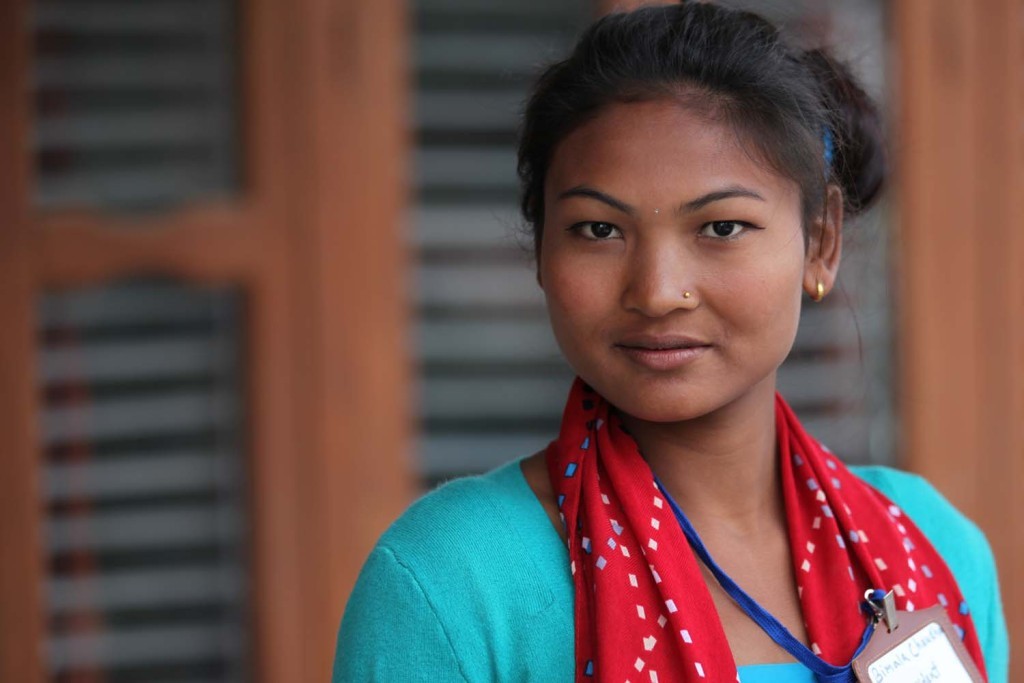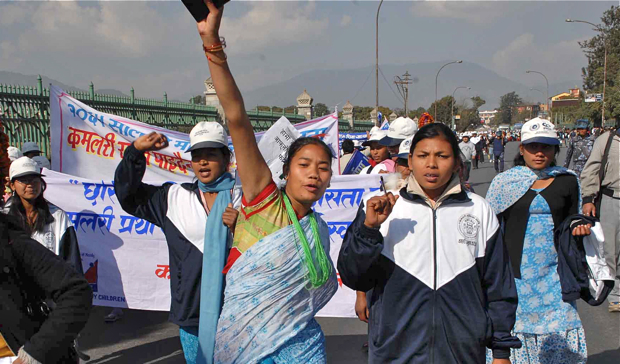Life Out of the Cage – Former Kamalari Bimala Helps Girls Like Her
A version of this story was originally published by Nepal Youth Foundation on their organization’s blog.

The Kamalari system and a lost childhood
Bimala’s family had no land of their own. She had no choice but become a Kamalari (a traditional system of bonded domestic servitude in Nepal) because her parents were bonded slaves themselves. Born in western Nepal she had to leave her parents at the age of 10 and move to a landlord’s house in the capital city of Kathmandu. Having lived as a Kamalari for three years in Kathmandu and another three years in the city of Butwal, she spent her entire childhood in slavery.
While in Kathmandu, Bimala was given a nominal salary equal to 40USD a year. Once she moved to Butwal, even this small compensation was withheld. She fed only on scraps from her landlord’s table and slept on rags, rather than a bed or even a mattress. She was barely seen as a human being.
Hope for the future
Despite her terrible situation, Bimala held hope for her future. She knew education would help her better her condition and plead with her landlord to allow her to go to school. While he refused to let her attend classes, he agreed that she could take the final exams each year if she studied at home to prepare for them. But only if her parents performed her work for her while she sat for exams. Bimala studied diligently and passed the exams for the first three years. Once her landlord moved her to Butwal though, her parents could no longer make the trip to the house to take her place during exams and she was denied even this small opportunity to continue her studies.
In 2009, at the age of 16, Bimala was rescued and freed by Nepal Youth Foundation (NYF), the organization founded by 2007 World of Children Humanitarian Honoree Olga Murray.
Life out of the cage
After her rescue, Bimala was able to enroll in school. Despite not formally attending school in six years, her studying paid off. She was admitted to grade nine and began working hard in school. As she studied, she learned more about the potentials of civil leadership and decided she wanted to stand up for others like her. She began representing her class and her fellow Kamalaris during protests and civil movements. Recognizing her potential, NYF’s Freed Kamalari Development Forum nominated her as their Central President in 2013. Now 20 years old, Bimala is leading the forum of over 12,000 freed Kamalaris across 5 districts in the western Tarai region of Nepal. Bimala has shouldered this huge responsibility with ease and courage.

She says that she sees her current life as an opportunity for a second start. “I would have never had this opportunity to fight on behalf of the entire community of freed Kamalries had I not been rescued into this life of freedom,” she says. “I used to feel that I was living inside a cage. But my life has changed beyond my imagination.” She now commands respect in the society. Her parents are amazed at her success, but express sorrow at having had to let her become a Kamalari as a child.
Bimala recognizes that the choice her parents made was shaped by civil and economic factors that, though so firmly entrenched in her society just ten years ago, are starting to change. Her father and brother, who were both formerly bonded laborers, are working abroad and have made enough money to buy a small section of land in their village. They farm this land, as well as some land they are currently leasing.
“Earlier, you had to send your daughter to become a Kamalari to secure a lease,” Bimala explains. “But the times have changed. The environments that forced people into slavery have begun to disappear.”
Through the tireless work of organizations like NYF and the courage of individuals like Bimala, more and more people will be set free and fewer children will face the dark prospects of childhood lost to slavery.
Learn more
Learn more about Olga Murray >>